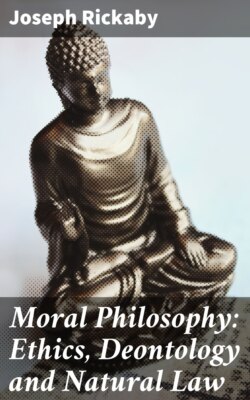Читать книгу Moral Philosophy: Ethics, Deontology and Natural Law - Joseph Rickaby - Страница 8
На сайте Литреса книга снята с продажи.
OF HAPPINESS. SECTION I.—Of Ends.
Оглавление1. Every human act is done for some end or purpose. The end is always regarded by the agent in the light of something good. If evil be done, it is done as leading to good, or as bound up with good, or as itself being good for the doer under the circumstances; no man ever does evil for sheer evil's sake. Yet evil may be the object of the will, not by itself, nor primarily, but in a secondary way, as bound up with the good that is willed in the first place.
2. Many things willed are neither good nor evil in themselves. There is no motive for doing them except in so far as they lead to some good beyond themselves, or to deliverance from some evil, which deliverance counts as a good. A thing is willed, then, either as being good in itself and an end by itself, or as leading to some good end. Once a thing not good and desirable by itself has been taken up by the will as leading to good, it may be taken up again and again without reference to its tendency. But such a thing was not originally taken up except in view of good to come of it. We may will one thing as leading to another, and that to a third, and so on; thus one wills study for learning, learning for examination purposes, examination for a commission in the army, and the commission for glory. That end in which the will rests, willing it for itself without reference to anything beyond, is called the last end.
3. An end is either objective or subjective. The objective end is the thing wished for, as it exists distinct from the person who wishes it. The subjective end is the possession of the objective end. That possession is a fact of the wisher's own being. Thus money may be an objective end: the corresponding subjective end is being wealthy.
4. Is there one subjective last end to all the human acts of a given individual? Is there one supreme motive for all that this or that man deliberately does? At first sight it seems that there is not. The same individual will act now for glory, now for lucre, now for love. But all these different ends are reducible to one, that it may be well with him and his. And what is true of one man here, is true of all. All the human acts of all men are done for the one (subjective) last end just indicated. This end is called happiness.
5. Men place their happiness in most different things; some in eating and drinking, some in the heaping up of money, some in gambling, some in political power, some in the gratification of affection, some in reputation of one sort or another. But each one seeks his own speciality because he thinks that he shall be happy, that it will be well with him, when he has attained that. All men, then, do all things for happiness, though not all place their happiness in the same thing.
6. Just as when one goes on a journey, he need not think of his destination at every step of his way, and yet all his steps are directed towards his destination: so men do not think of happiness in all they do, and yet all they do is referred to happiness. Tell a traveller that this is the wrong way to his destination, he will avoid it; convince a man that this act will not be well for him, will not further his happiness, and, while he keeps that conviction principally before his eyes, he will not do the act. But as a man who began to travel on business, may come to make travelling itself a business, and travel for the sake of going about; so in all cases there is a tendency to elevate into an end that which was, to start with, only valued as a means to an end. So the means of happiness, by being habitually pursued, come to be a part of happiness. Habit is a second nature, and we indulge a habit as we gratify nature. This tendency works itself to an evil extreme in cases where men are become the slaves of habit, and do a thing because they are got into the way of doing it, though they allow that it is a sad and sorry way, and leads them wide of true happiness. These instances show perversion of the normal operation of the will.
Readings.—St. Thos., 1a 2æ, q. 1, art. 4, in corp.; ib., q. 1, art. 6, 7; ib., q. 5, art. 8; Ar., Eth., I., vii., 4, 5.
